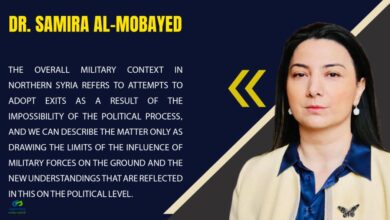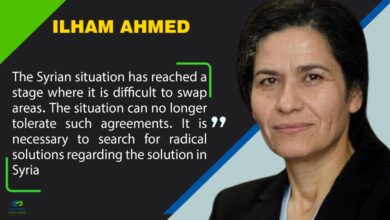Issam Zeitoun to Ugarit Post: The Arab move towards Damascus is one of the files of the Saudi-Iranian settlement..The Arab conditions for normalization are many, and none of them has been achieved
Ugarit Post - Unprecedented moves by a number of Arab countries, headed by Saudi Arabia, after 12 years of diplomatic isolation on the Syrian government. The last period witnessed the restoration of relations with Bashar al-Assad, which paves the way for a new coming period that may differ from previous years.

In the first official visit, Saudi Arabia received, last Wednesday, the Syrian Foreign Minister, Faisal Al-Miqdad, and this visit came before the meeting that brought together the foreign ministers of the Gulf Cooperation Council countries, Jordan, Egypt and Iraq in the Saudi city of Jeddah. The final statement of this meeting revealed a wide division over the return of the Syrian government to the Arab League.
During an exclusive interview with the independent Syrian opposition and founder of the Syrian Peace Initiative, Issam Zaytoun, the “Ugarit Post” network raised many questions about the Arab moves towards the Syrian government and the possibility of Damascus returning to the Arab League.
What is your comment on the restoration of diplomatic relations between Saudi Arabia and the Syrian government?
There is no restoration of diplomatic relations between the two countries. Rather, it is an agreement to open consulates that take care of the affairs of Syrian residents in Saudi Arabia and the affairs of Saudis in Syria without communication between the leaderships through diplomatic missions, as is customary between countries.
Is the Arab move towards Damascus aimed at implementing a project or an upcoming plan to solve the Syrian crisis?
The Arab move towards Damascus reflects the Arab desire to resolve the tragedy of the Syrian people inside and outside Syria, after the situation in Syria has been stabilized internationally and regionally as it is.
The generous Arab move and the Arab opportunity offered to the Syrian regime comes despite the fact that all Arabs know that Syria, whose regime was expelled from the Arab League in 2011 due to crimes against its people, is by no means Syria in 2023.
Demographically, more than 20 million Syrians left Syria, the overwhelming majority of whom were Sunni Arabs. They were replaced by mainly Shiite citizens loyal to both the Syrian and Iranian regimes. The problem is that the regime does not see a problem with that, rather it declared that the Syrian people have become homogeneous.
Politically, Syria is a country that lacks sovereignty, even in areas controlled by the Assad regime. It is not the only decision-maker. Geographically, Syria is divided and occupied by more than one side, and there is a chaos of weapons, militias, and loyalties. Economically, Syria is a collapsed, failed state, and the people are on the brink of starvation.
However, this move is a prelude to what comes after it. If the Syrian regime agrees to the Arab conditions and implements them, especially the safe return of refugees and acquiescence to a political solution that guarantees the transfer of power to a transitional governing council in accordance with Resolution 2254, which Egypt clings to and conditions its implementation as a condition for normalizing relations, then if the regime adheres to it, then this means its end. and the inevitability of his peaceful departure. And in the event that the regime refuses – which is expected – there will be other arrangements, especially since this Arab move towards the regime is one of the files of the draft Saudi-Iranian agreement or settlement under the auspices and guarantee of China.
Media outlets talked about the lack of Arab consensus for the return of the Syrian government to the Arab League.. What do you think of that?
There are countries that strongly reject the return of the Assad regime to the Arab League on the grounds that the Arabs have tried a lot to persuade and lure it out of the Iranian anti-Arab alliance to no avail, namely Morocco, Kuwait and Qatar, but the statement of the meeting of foreign ministers of the Arab Gulf states in addition to Egypt, Jordan and Iraq, this statement in all its paragraphs suggests that The Arab conditions for the Assad regime are many, and none of them have been fulfilled, and the Arab disagreement ranges from categorical rejection to conditional approval.
Will Arab attempts at normalization with the Syrian government fail because of the American and European position rejecting these moves?
It will not fail because of the American and European position rejecting any change in the current situation in Syria, but rather it will fail because there is no common ground from which to find a solution to the Syrian tragedy. We do not find that Al-Assad sees any problem in Syria, but he goes to the meeting as a victor and hopes to impose his conditions on the Arabs, and it is not far from asking them to make apologies and pay compensation. From day one, he accused them of financing and supporting popular movements, starting in 2011.
How do you see the next phase of the Syrian crisis?
The next stage, according to my estimation, is a stage of comprehensive military confrontations, as this regime will not leave except by force. The Iranian regime will not abandon its expansionist and nuclear ambitions except by force.
The Syrian issue is closely linked to the Iranian file and even to the Russian-European clash in Ukraine, and is directly affected by the inclination of the balance of power on all fronts. This is what the Kingdom of Saudi Arabia and the Arabs behind it realized, and on the basis of which it moved with wisdom and ingenuity.





